
This choice board can be used at multiple grade levels as a reading promotion and encourage diversity in reading.
- Subject:
- English Language Arts
- Reading Informational Text
- Reading Literature
- Material Type:
- Activity/Lab
- Date Added:
- 07/10/2020

This choice board can be used at multiple grade levels as a reading promotion and encourage diversity in reading.
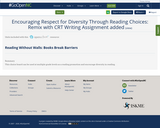
This choice board can be used at multiple grade levels as a reading promotion and encourage diversity in reading.

In this unit, students will take a look at the historical vision of the American Dream as put together by our Founding Fathers. They will be asked: How, if at all, has this dream changed? Is this dream your dream? First students will participate in an American Dream Convention, acting as a particular historical figure arguing for his or her vision of the American Dream, and then they will write an argument laying out and defending their personal view of what the American Dream should be.
ACCOMPLISHMENTS
Students read and annotate closely one of the documents that they feel expresses the American Dream.
Students participate in an American Dream Convention, acting as a particular historical figure arguing his or her vision of the American Dream.
Students write a paper, taking into consideration the different points of view in the documents read, answering the question “What is the American Dream now?”
Students write their own argument describing and defending their vision of what the American Dream should be.
GUIDING QUESTIONS
These questions are a guide to stimulate thinking, discussion, and writing on the themes and ideas in the unit. For complete and thoughtful answers and for meaningful discussions, students must use evidence based on careful reading of the texts.
What has been the historical vision of the American Dream?
What should the American Dream be? (What should we as individuals and as a nation aspire to?)
How would women, former slaves, and other disenfranchised groups living during the time these documents were written respond to them?
BENCHMARK ASSESSMENT: Cold Read
During this unit, on a day of your choosing, we recommend you administer a Cold Read to assess students’ reading comprehension. For this assessment, students read a text they have never seen before and then respond to multiple-choice and constructed-response questions. The assessment is not included in this course materials.

In this lesson, students will share their work with their classmates and celebrate their accomplishments.

In this 5-day unit, students will explore the topic of cheating. Cheating seems to be ever-present in today’s society. Whether we are talking about athletes being busted for using steroids or students “sharing” answers and plagiarizing on final exams, one thing is clear—there’s a whole lot of cheating going on. In this unit, students will take a look at some contemporary instances of cheating and argue whether under certain situations cheating is not only excusable, but also justifiable.

In this lesson, students will share annotations and discuss the articles “Don’t Alter Models’ Bodies” and “Is Photoshop Destroying America’s Body Image?” Then they will write an argument in which they state their claim, present relevant evidence, and respond to counterarguments.

In this lesson, you will take the writing portion of the culminating assessment. You will continue to use the skills you have learned in the first three lessons of this unit.Today, students will take the writing portion of the culminating assessment.They will reflect on all the material they have read in this unit, and they will use their understanding of all the material presented to them to write an essay. You will evaluate their work in both reading comprehension and writing.

This unit uses William Shakespeare’s Much Ado About Nothing as a vehicle to help students consider how a person is powerless in the face of rumor and how reputations can alter lives, both for good and for ill. They will consider comedy and what makes us laugh. They will see how the standards of beauty and societal views toward women have changed since the Elizabethan Age and reflect on reasons for those changes. As students consider the play, they will write on the passages that inspire and plague them and on topics relating to one of the themes in the play. Finally, they will bring Shakespeare’s words to life in individual performances and in group scene presentations.
ACCOMPLISHMENTS
Students read Shakespeare’s Much Ado About Nothing .
Students read two Shakespearean sonnets and excerpts from an Elizabethan morality handbook dealing with types of women, and they respond to them from several different perspectives.
For each work of literature, students do some writing. They learn to write a sonnet; create a Prompt Book; complete a Dialectical Journal; and write an analytical essay about a topic relating to a theme in the play.
Students see Shakespeare’s play as it was intended to be seen: in a performance. They memorize 15 or more lines from the play and perform them for the class. Students take part in a short scene as either a director or an actor.
GUIDING QUESTIONS
These questions are a guide to stimulate thinking, discussion, and writing on the themes and ideas in the unit. For complete and thoughtful answers and for meaningful discussions, students must use evidence based on careful reading of the texts.
What are society’s expectations with regard to gender roles?
Does humor transcend time? Do we share the same sense of humor as our ancestors?
How do we judge people?
How important is reputation?
BENCHMARK ASSESSMENT (Cold Read)
During this unit, on a day of your choosing, we recommend you administer a Cold Read to assess students’ reading comprehension. For this assessment, students read a text they have never seen before and then respond to multiple-choice and constructed-response questions. The assessment is not included in this course materials.
CLASSROOM FILMS
The Branagh version of Much Ado About Nothing is available on DVD through Netflix and for streaming through Amazon. Other versions are also available on both sites.

In this lesson, students will revise the final couplet of their sonnet, learn more about the characters in Much Ado About Nothing, and begin their Dialectical Journal. Finally, they will use their developing understanding of iambic pentameter to analyze Shakespeare’s language choices.
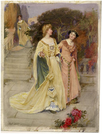
In this lesson, students will come to see how the concept of deception can be looked at in more than one way and how this factors into Much Ado About Nothing ’s character development.

In this lesson, students will take a closer look at the villain of this play. Is Don John really so evil? Has evil been done to him? Then they’ll learn about Dogberryisms and see whether they can interpret some of them themselves.
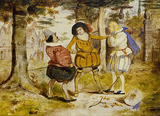
In this lesson, students will continue reading Much Ado About Nothing aloud and then compare and contrast the directorial choices made in two staged versions of act 2, scene 3.
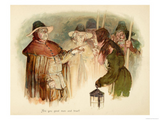
In this lesson, students will analyze the humor in language that is embedded in Much Ado About Nothing and maybe come to appreciate it a little bit more.

The purpose of this second Benchmark Assessment (Cold Write) is to determine what students know about informational writing. Students will respond to a writing prompt, and you will score results as a measure of progress. Following this assessment, students will practice conducting close analysis of various passages from Much Ado About Nothing and continue their character analysis by writing a Perfect Paragraph.
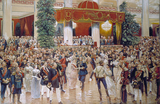
In this lesson, students will begin reading Shakespeare’s Much Ado About Nothing aloud in class and make predictions based on what they’ve learned so far. For homework, they will finish their sonnet’s final couplet.
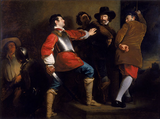
In this lesson, students will consider how rumor can ruin a reputation, even if it’s not true, and how difficult it is to try to proclaim innocence. They’ll also get to see how Shakespeare dealt with these very human problems through the characters in Much Ado About Nothing.
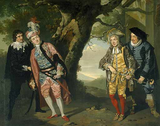
In this lesson, students will learn more about the characters and the plot of Much Ado About Nothing and consider the role of leadership. They will also analyze what they’ve read so far and make predictions about the fates of the play’s characters.
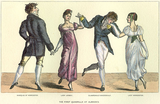
In this lesson, you will administer a Benchmark Assessment (Cold Write) to determine what students already know about argument writing. Students will respond to a prompt, and then you will assess each student’s argument, using the scoring guide, as a measure of early work. Students will have opportunities to write arguments throughout the year, during which they will have instruction on how to revise and edit their pieces. The information you gain from scoring this benchmark piece of writing will guide you in tailoring your writing instruction to individual student needs.

In this lesson, the performances continue. The final group of students will perform their memorized passages from Much Ado About Nothing .

In this lesson, students will see the Prompt Books as finished performances and reflect on what they’ve learned from Shakespeare during this unit.